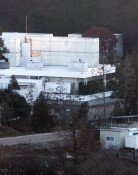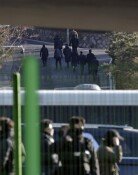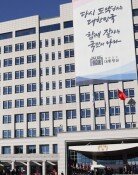N. Korea’s chief nuclear negotiator blames U.S. for falling of nuclear talks
N. Korea’s chief nuclear negotiator blames U.S. for falling of nuclear talks
Posted October. 07, 2019 07:20,
Updated October. 07, 2019 07:20
The U.S.-North Korea working-level talks on denuclearization took place on Saturday (local time) at a beautiful conference facility in the suburb of Stockholm, Sweden surrounded by ocean. Despite the negative one degree Celsius weather, dozens of reporters from South Korea, the U.S., Japan, Sweden, etc. gathered to cover negotiations between North Korea's chief nuclear negotiator Kim Myong Gil and U.S. Special Envoy for North Korea Stephen Biegun.
Kim showed up to the venue at 9:40 a.m. on the day. To the question asking if he expects positive outcomes from negotiations, he answered, “Let’s see how it goes,” with a smile. Biegun who arrived earlier greeted the North Korean representative with a smile. The two seemed to be full of expectations.
However, such a friendly atmosphere didn’t last longer than two hours and 20 minutes. The North Korean negotiation team left the negotiation venue and returned to the North Korean Embassy located in Stockholm's harbor in the suburb of Lidingö around noon. About two hours and 20 minutes later, the team came back to the venue, but this time with hardened expressions on their faces. Kim did not answer a question asking why they left in the middle of the talks.
Kim announced the breaking off of the negotiations at the North Korean Embassy at 6:32 p.m. on the same day. The North Korean team had not responded to reporters’ questions from Thursday until this moment. However, Kwon Jong Gun, the director general of the North Korean foreign ministry's Department of American Affairs who is serving as the deputy chief of the nuclear negotiations, told reporters to wait as they would soon make a statement. About seven minutes later, the chief negotiator read the three to four-page long statement with a hardened face in front of reporters.
After reading the statement for around 11 minutes, the North Korean negotiation team said they would take three questions, which is unusual. Reporters asked questions, including “Did the U.S. make no gesture to ensure North Korea’s political system to be maintained?” and “Would North Korea continue the suspension of intercontinental ballistic missile test launches and nuclear tests by the end of this year?,” however, the North Korean side kept repeating answers blaming the U.S. “Whether we will maintain the suspension of intercontinental ballistic missile test launches and nuclear tests or not is completely up to the U.S. now,” said Kim at the end.
Youn-Jong Kim zozo@donga.com







